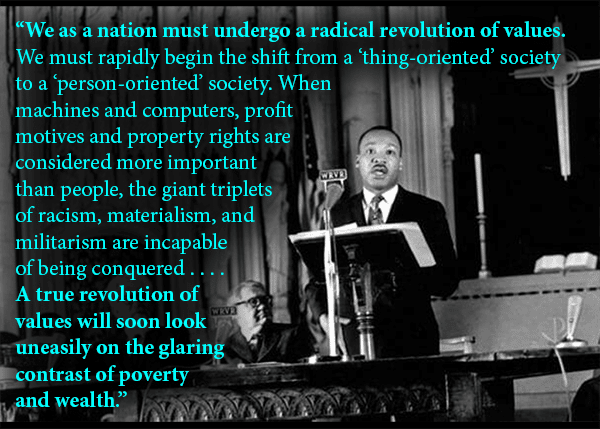On April 4, 1967, Dr. Martin Luther King Jr. gave what some have called one of the most important speeches in US history, titled “Beyond Vietnam”. Dr. King Jr. delivered the sermon at Riverside Church in NYC in the company of religious leaders of multiple denominations and faiths.
This and some of his prior speeches helped energize the anti-war movement. His “call to conscience” was not well-received by Pres. Johnson and other elected officials, as well as some in the Civil Rights movement.
Many then turned against Dr. King for being against the war and the country’s supposed fight against communism. He was assassinated exactly one year later.
What his speech then has to do with hunger now
In Beyond Vietnam, Dr. King made clear the connection between militarism and economic injustice:
There is at the outset a very obvious and almost facile connection between the war in Vietnam and the struggle I and others have been waging in America. A few years ago there was a shining moment in that struggle. It seemed as if there was a real promise of hope for the poor, both black and white, through the poverty program. There were experiments, hopes, new beginnings. Then came the buildup in Vietnam, and I watched this program broken and eviscerated as if it were some idle political plaything of a society gone mad on
war. And I knew that America would never invest the necessary funds or energies in rehabilitation of its poor so long as adventures like Vietnam continued to draw men and skills and money like some demonic, destructive suction tube.”
This year’s MLK Day comes just a few weeks after Congress voted, two days before Christmas, to end SNAP Emergency Allotments in its budget legislation that funds the federal government through September.
- The package increased defense spending by 10% – much more than the 4% bump Pres. Biden wanted – to a total of $858 Billion. This is more than what the next nine nations spend on defense combined.
- In contrast, the package increased non-defense discretionary spending by about 5.5% to a total of $772.5 Billion. This was less than the 6.7% increase for fiscal 2022 and the 10% boost President Biden had requested.
“Non-defense discretionary spending” is the funding that Congress sets annually for our country’s domestic and international programs. SNAP, the nation’s cornerstone anti-hunger program, is not part of this category. Its total funding isn’t set by Congress; it’s an entitlement program that guarantees benefits to whoever is eligible.
So total SNAP spending automatically goes up in some years and down in others, depending on need.
The cost – and the value – of SNAP
SNAP’s annual federal costs depend on how many people are enrolled and how much they’re allowed to receive. Congress sets SNAP’s baseline eligibility rules and benefit levels every five years in the U.S. Farm Bill.
- The USDA and the president can change some SNAP policies more often, as the Biden administration did during the pandemic to add a 15% increase to SNAP benefits.
- States can also choose to give more to SNAP recipients and expand eligibility, as Gov. Wolf just did in October, giving nearly half a million more Pennsylvanians access to food stamps.
So what has SNAP cost the US lately? Federal spending on SNAP in Fiscal Year 2021 amounted to nearly $114 billion, for an average daily participation of 41.5 million people, or 12.5 percent (1 in 8) of the U.S. population. This was roughly 6 million people fewer than the record-high participation of fiscal year FY 2013 but because Congress raised benefits during the pandemic, spending in 2021 was a record high.
Our record-high SNAP spending that year was still only roughly .08% of the $1.4 Trillion total US budget. In other words, what we spent on food stamps was like the spare change the US found in its couch.In return, SNAP generates much more than that in economic gains by supporting the stores and communities where food stamps are spent. By helping people buy food, SNAP can also free up dollars for recipients – low-wage families, military members, Olympic athletes and fledgling entrepreneurs, seniors, and those with disabilities – to spend on other necessities.
And hunger has its own cost: roughly $160 billion a year in harm to Americans’ health. That’s aside from hunger’s incalculable costs to educational outcomes, labor productivity, crime rates, and much more.
Changing our nation’s priorities
Congress is due to renew the five-year Farm Bill by September 30.
Dr. King called for a “revolution of values” so that Americans would reject the mechanisms in our society that were creating a huge gap between the haves and have-nots. This gap has become a chasm and is even bigger when looked at across race.
In the coming months, Just Harvest will be calling on PA’s elected officials in DC to support measures in the Farm Bill to increase SNAP benefit allotments and allow more people to become eligible for food stamps.
This is the very least we can do as a nation – to no longer tolerate rampant hunger and poverty in the U.S. just so millionaires can become billionaires through huge tax breaks and disproportionate power.
As Dr. King advised us, ending wealth inequality and economic justice is the only moral thing to do.
 Sign up for our newsletter and Action Alerts to join us in this work!
Sign up for our newsletter and Action Alerts to join us in this work!





No comments yet.